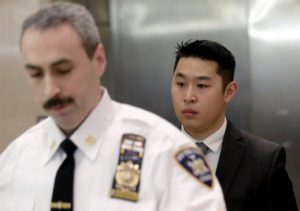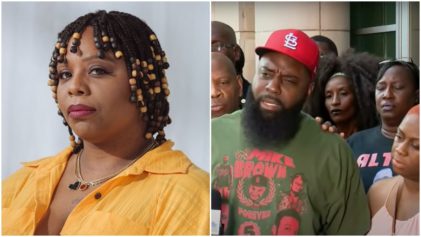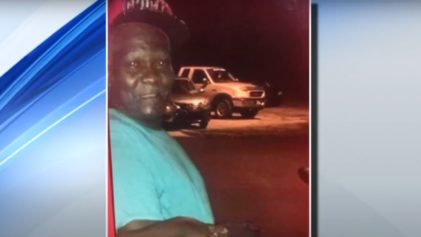
New York City Police (NYPD) officer Peter Liang (R) is escorted by a court officer inside the criminal court after an arraignment hearing in the Brooklyn borough of New York City February 11, 2015. BRENDAN MCDERMID / Reuters
Peter Liang, the NYPD rookie police officer charged in the infamous stairwell death of Akai Gurley — an unarmed Black man in an East New York housing project — was convicted of reckless manslaughter.
Liang was found guilty of the most serious charge, and according to the Washington Post was fired from the department. The case stems from a November 20, 2014 incident in which the officer was patrolling the Brooklyn building, gun drawn, and opened fire when Gurley and his girlfriend opened a door to the stairwell.
The bullet ricocheted off a wall and hit Gurley, 28, on a lower floor, as WNYC reported. According to prosecutors, the officer’s actions were reckless and he tried to hide the fact that he had discharged his gun. Further, the prosecution argued Liang was reckless with his weapon and violated his duty to serve and protect by failing to perform CPR on the victim. Liang maintained the shooting was accidental.
Ken Thompson, Kings County district attorney, said the ruling showed that “no matter where you live in Brooklyn, your life matters” as the Guardian reported. Meanwhile, Scott Rynecki, the attorney representing the Gurley family in a civil suit, responded to the decision by saying “no one is here rejoicing at the fact that this officer was convicted… but the message was sent… that if a police officer does something wrong their actions will be held accountable and will be held accountable in a court of law.”
Police commissioner William J. Bratton called this episode an accident and said Gurley was “totally innocent.” “The jury has now spoken, and we respect its decision,” said Mayor Bill de Blasio. “We hope today’s outcome brings some closure to the Gurley family after this painful event.”

Akai Gurley
And Patrick J. Lynch, the NYPD police union chief, concluded the verdict would have a “chilling effect,” adding: “We are very disappointed in the verdict and believe that the jury came to an absolutely wrong decision. This was a terrible and tragic accident and not a crime.”
Last week, following the shooting of two officers in a Bronx stairwell, Lynch suggested that cops need to have their guns drawn when entering such stairwells. Following the fatal execution-style shooting of two officers in December 2014, Lynch all but declared war against the Black citizens of New York, calling for a “wartime” police force in reaction to the #BlackLivesMatter movement.
In the verdict, Liang was also found guilty of misdemeanor official misconduct. He faces as much as 15 months in prison. Sentencing is set for April 14.
The case was significant in that it came only months after the police deaths of two other unarmed Black men — Michael Brown in Ferguson, Missouri, and Eric Garner in Staten Island. The difference in the case of Gurley was that it was a successful prosecution and a conviction.
And yet, such prosecutions remain rare. A New York Daily News analysis found there were at least 179 deaths by on-duty police officers in New York City the past 15 years. Only three of these deaths resulted in an indictment in state court, and in one case, a judge threw out the indictment on technical grounds and it was not reinstated. Meanwhile, only one officer who killed while on duty was convicted, though he was not sentenced to prison. From the 1999 shooting of Amadou Diallo to the more recent death of Gurley, the Daily News found that 27 percent of people killed by the NYPD were unarmed, and 86 percent were Black or Latino when the race was known. In addition, the worst year was 2012, when 21 people were killed, three by off-duty police officers.
At issue is the inherently conflicted role of the prosecuting attorney.
“In most of those cases it would be the local district attorney who’s bringing up the charges, if any,” said Robert Gangi, executive director of the Prison Reform Organizing Project. “There’s an inherent conflict of interest. . . . The police and DA work very closely together, and so they need each other to carry out their jobs,” said Gangi, who is encouraged by state lawmakers and Gov. Andrew Cuomo supporting the position of a special prosecutor to deal with police-related deaths.

Brooklyn District Attorney Ken Thompson
We should not lose sight of the fact that Ken Thompson is Black — unlike the vast majority of prosecutors in this country and in cases where Black people are killed by police. Across the nation, 95 percent of elected prosecutors are white, and 83 percent are men. Many white prosecutors have shown little regard for the lives of people killed by police, much less Black people, particularly in the many high-profile cases in recent years.
The decision by Thompson to prosecute police brutality cases is in line with his past experience as a federal prosecutor in the Eastern District of New York. In that capacity, he was part of a team that successfully prosecuted former New York City Police Officer Justin Volpe, who in 1997 brutally beat and tortured Haitian immigrant Abner Louima in a Brooklyn police precinct. Further, Thompson delivered the opening statement on behalf of the U.S. government at the Louima federal civil rights trial, according to the Brooklyn District Attorney’s office. Volpe ultimately plead guilty during the trial and is serving a 30-year federal prison term. In addition, Thompson worked with Congress and clergy members to re-investigate the 1955 murder of Emmett Till in Mississippi. In other words, when it comes to the successful prosecution and conviction of police officers, the prosecutor matters.


